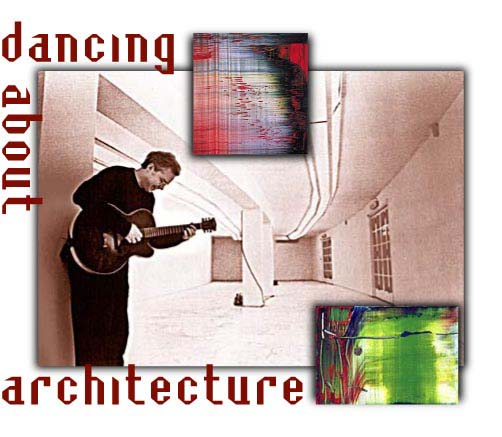|
COVER
STORY | IN THE NEWS | DIRT | STAGE
DOOR Jan. 27, 2005
by BOB DORAN IT WAS NONE OTHER THAN STEVE MARTIN WHO SAID, "TALKING about music is like dancing about architecture." The phrase popped up in conversation last week when I was talking about music with guitarist Bill Frisell, [photo above] discussing the origins of his 858 Quartet, a string combo he is bringing to town Feb. 1 for a show at the Morris Graves Museum of Art. The museum seems an appropriate venue since the quartet's name and its inception are directly connected to art, and its first public performance was at the San Francisco Museum of Modern Art. "The group came about because I was asked to write music for a series of paintings by Gerhard Richter," Frisell explained when I called him at his home in Seattle. The band name was drawn from the show. "He just puts numbers on his paintings; this was a series, 858, eight paintings." Richter is a German painter whose works in oil range from near photographic realism to bold abstraction. The 858 paintings are oils on sheets of aluminum -- minimal, absolutely abstract pieces with rich smears of vibrant color. "I tried to let the paintings inspire me in some way," said Frisell, "but the [compositions] are not direct representations in any way." Creating music inspired by art, Frisell's guitar work drew from a wide palette: from outside jazz and American roots music to minimalist neoclassical sounds. To add more colors, he brought in three string players, all of them former bandmates from one congregation or another. Cellist Hank Roberts comes from his first working group, the Bill Frisell Band. Eyvind Kang, violinist in the Bill Frisell Quartet of the mid-'90s, plays viola in the new quartet. Violinist Jenny Scheinman, who hails from Petrolia, was a member of Frisell's group The Intercontinentals and appeared on its eponymous album. The first assignment for Frisell's 858 Quartet was to record music to be included in a book, Richter 858, essentially an elaborate exhibition catalogue that also includes Richter-inspired work by poets Robert Hass, Dean Young, Brenda Hillman, W. S. Di Piero, Paul Hoover and David Breskin. "When we did the recording it was the first time we'd played together as a group," said Frisell. "It was a great thing for me because they're all people I've played with a lot, but never as one string group. All of them have played in my different groups at different times and we're all good friends. "Putting it all together and having a chance to write for strings was great, and also that fact that these were people I know and trust -- not like I had the Juilliard String Quartet or something. They were patient -- I could try anything and not be afraid to check it out and see what it sounds like. That's the whole thing for me, being with people I like. You hear about bands where guys aren't speaking with each other; I can't imagine that. I wouldn't be able to play if I was not comfortable with the people I was with." In addition to the recording, Frisell and company performed a concert at the SF-MOMA in January 2003 in conjunction with a reading by the poets. "We had another concert where we did the music from the paintings, but also another set; so I scrambled around and got a few more things together. Then I got them all to play on my latest album, Unspeakable, so the group has taken on a life of its own." In 2004 his album, The Intercontinentals, was nominated for a Grammy, and now he's up for another for Unspeakable. The prospect of winning the industry's top award doesn't seem to affect him one way or the other. "I don't even know what it really means, if anything," he said with a sigh. "The categories are all so weird." Where does he fit into the Grammy scheme of things? He's nominated for "Best Contemporary Jazz Album" where his competition includes Roy Hargrove, Jan Garbarek, Don Grusin and Fourplay. "They're all so different," he noted. The Unspeakable record, recorded with producer Hal Wilner at the helm, finds Frisell exploring more new musical territory using the 858 Strings (as they are listed in the liner notes) on most songs. Wilner is credited on many tracks for playing turntables, although he does not use them as a hip-hop turntablist might, and most of the time it's hard to discern where there's something that came from a record player. "Sometimes the music came from something he played on the record -- we played along with it -- but then he took [the turntable part] away later," Frisell explained. "The strings were the last thing we did. That album was more about working with Hal than anything. It's more about the chemistry, the atmosphere that's created just by his personality being there. That's really what music is for me -- so much of it is about the vibe you get from the people that you're playing with. It's not so much the instruments, it's more about the people being together." In the end he concedes that winning a Grammy would not be a bad thing. "Maybe I'll sell some more records. Then I can make more music with my friends." As if you could stop him. Bill Frisell's 858 Quartet performs Tuesday, Feb. 1, at 8 p.m. in the rotunda of the Morris Graves Museum of Art, 636 F St., Eureka. Admission is $25, advance tickets are recommended. Call 442-0278 for further details. For more on Bill Frisell go to www.billfrisell.com.
Bob Doran COVER
STORY | IN THE NEWS | DIRT | STAGE
DOOR Comments? Write a letter! © Copyright 2005, North Coast Journal, Inc. |

